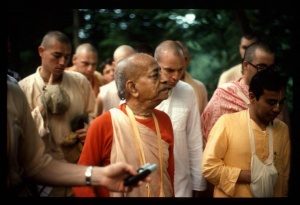CC Adi 17.135: Difference between revisions
m (1 revision(s)) |
No edit summary |
||
| Line 1: | Line 1: | ||
{{ | [[Category:Sri Caitanya-caritamrta - Adi-lila Chapter 17|C135]] | ||
<div style="float:left">'''[[Sri Caitanya-caritamrta|Śrī Caitanya-caritāmṛta]] - [[CC Adi|Ādi-līlā]] - [[CC Adi 17|Chapter 17: The Pastimes of Lord Caitanya Mahāprabhu in His Youth]]'''</div> | |||
<div style="float:right">[[File:Go-previous.png|link=CC Adi 17.134|Ādi-līlā 17.134]] '''[[CC Adi 17.134|Ādi-līlā 17.134]] - [[CC Adi 17.136|Ādi-līlā 17.136]]''' [[File:Go-next.png|link=CC Adi 17.136|Ādi-līlā 17.136]]</div> | |||
{{CompareVersions|CC|Adi 17.135|CC 1975|CC 1996}} | |||
{{RandomImage}} | |||
==== TEXT 135 ==== | ==== TEXT 135 ==== | ||
<div | <div class="verse"> | ||
eta kahi’ sandhyā-kale cāle gaurarāya | :eta kahi’ sandhyā-kale cāle gaurarāya | ||
kīrtanera kaila prabhu tina sampradāya | :kīrtanera kaila prabhu tina sampradāya | ||
</div> | </div> | ||
| Line 12: | Line 16: | ||
==== SYNONYMS ==== | ==== SYNONYMS ==== | ||
<div | <div class="synonyms"> | ||
eta | ''eta kahi''’—saying this; ''sandhyā-kāle''—in the evening; ''cale''—went out; ''gaura-rāya''—Gaurasundara; ''kīrtanera''—of performing ''saṅkīrtana''; ''kaila''—made; ''prabhu''—the Lord; ''tina''—three; ''sampradāya''—parties. | ||
</div> | </div> | ||
| Line 19: | Line 23: | ||
==== TRANSLATION ==== | ==== TRANSLATION ==== | ||
<div | <div class="translation"> | ||
In the evening Lord Gaurasundara went out and formed three parties to perform kīrtana. | In the evening Lord Gaurasundara went out and formed three parties to perform kīrtana. | ||
</div> | </div> | ||
| Line 26: | Line 30: | ||
==== PURPORT ==== | ==== PURPORT ==== | ||
<div | <div class="purport"> | ||
This is a scheme for performing kīrtana in a procession. During Śrī Caitanya Mahāprabhu’s time, one party was composed of twenty-one men: four people playing mṛdaṅgas, one leading the chanting, and sixteen others striking karatālas, responding to the leading chanter. If many men join the saṅkīrtana movement, they may follow in the footsteps of Śrī Caitanya Mahāprabhu and form different parties according to the time and the number of men available. | This is a scheme for performing ''kīrtana'' in a procession. During Śrī Caitanya Mahāprabhu’s time, one party was composed of twenty-one men: four people playing ''mṛdaṅgas'', one leading the chanting, and sixteen others striking ''karatālas'', responding to the leading chanter. If many men join the ''saṅkīrtana'' movement, they may follow in the footsteps of Śrī Caitanya Mahāprabhu and form different parties according to the time and the number of men available. | ||
</div> | </div> | ||
__NOTOC__ | |||
<div style="float:right; clear:both;">[[File:Go-previous.png|link=CC Adi 17.134|Ādi-līlā 17.134]] '''[[CC Adi 17.134|Ādi-līlā 17.134]] - [[CC Adi 17.136|Ādi-līlā 17.136]]''' [[File:Go-next.png|link=CC Adi 17.136|Ādi-līlā 17.136]]</div> | |||
__NOTOC__ | |||
__NOEDITSECTION__ | |||
Revision as of 13:39, 24 July 2021

A.C. Bhaktivedanta Swami Prabhupada
TEXT 135
- eta kahi’ sandhyā-kale cāle gaurarāya
- kīrtanera kaila prabhu tina sampradāya
SYNONYMS
eta kahi’—saying this; sandhyā-kāle—in the evening; cale—went out; gaura-rāya—Gaurasundara; kīrtanera—of performing saṅkīrtana; kaila—made; prabhu—the Lord; tina—three; sampradāya—parties.
TRANSLATION
In the evening Lord Gaurasundara went out and formed three parties to perform kīrtana.
PURPORT
This is a scheme for performing kīrtana in a procession. During Śrī Caitanya Mahāprabhu’s time, one party was composed of twenty-one men: four people playing mṛdaṅgas, one leading the chanting, and sixteen others striking karatālas, responding to the leading chanter. If many men join the saṅkīrtana movement, they may follow in the footsteps of Śrī Caitanya Mahāprabhu and form different parties according to the time and the number of men available.